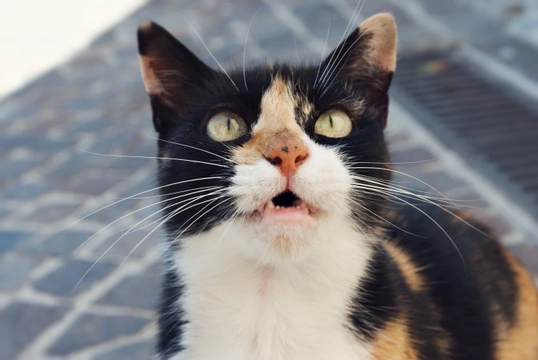
Why do some cats become very vocal as they get older?
Just as people go through marked changes as they get older, both physically and mentally, the same is true for cats. When cats begin to reach old age (generally considered to be over the age of around ten, although cats are classed as “mature” past the age of around seven or eight) they too will likely begin to exhibit some changes, such as getting more grey hairs, losing or gaining weight, becoming less active, and in some cases, beginning to lose their sight, hearing or sense of smell.
One side-effect of aging that many cat owners begin to notice as their cats become elderly is that some cats tend to become a lot more vocal than they used to be, either meowing a lot more in general, or questing about chirping, trilling and meowing and even yowling-particularly during the night or when no one is around!
While this sort of behaviour is often written off as a basic anomaly of aging and something that is not a major problem in and of itself (unless it keeps you awake!) it is worth looking at some of the potential causes behind it, as becoming very vocal in old age can potentially indicate a problem in the making that may in some cases be treatable.
It is of course totally possible that your kitty is just becoming more chatty without any real root cause, or because they are looking for you due to the decline in their other senses, which would previously have let them know where you are-but within this article, we will look at some of the potentially problematic key reasons behind excessive vocalisation in older cats.
Pain or discomfort
Old age leads to a range of aches and pains in all species of animals, and if your cat is in pain or otherwise uncomfortable, they may get noisy about it! Getting your cat checked over by the vet when they reach old age is something that you should arrange on at least an annual basis, and many vets will ask to see elderly cats every six months or so if necessary, or if they have any concerns.
When it comes to older cats and discomfort, this may be as simple as the fact that they could be feeling the cold more, and are not impressed about it, so review your cat’s living situation with a view to helping their old age to be a more comfortable one regularly too.
Feline dementia and related conditions
Just as old people can tend to become forgetful or prone to confusion as they age, the same too can happen in cats, and how pronounced this is will vary from case to case.
Cats can and sometimes do develop conditions that are equivalent to dementia in humans, and if your cat yowls a lot or meows in a questioning way, particularly at night, they may well have just woken up in confusion at where they are and what is happening.
Ask your vet to assess your cat and make some suggestions on how to support their aging brains.
Thyroid issues
Thyroid issues in cats are much more common in mature cats than younger ones, and hyperthyroidism, or an overactive thyroid gland, is a common complaint of feline old age.
Hyperthyroidism can lead to an almost constant hunger and thirst in the cat, regardless of how much they eat or drink, which can cause them to become very vocal-but fortunately, the condition can be managed with medication, to restore your cat to their old selves.
High blood pressure
High blood pressure is something else that is more common in elderly cats than younger ones, and can lead to a range of problems such as headaches, racing pulse, and generalised discomfort that might make your cat yowl or otherwise vocalise their distress.
Again, however, this is something that can be managed with medication.
Disorientation due to sensory decline
If your cat’s aging is leading to a loss of acuity in their core senses, such as hearing, sight and smell, this can lead to a range of issues such as showing less interest in food, missing cues, and generally feeling out of touch with things and so, unsettled.
Finding out for sure if your cat is beginning to lose some of their senses can help you to manage and address the issue.
Bone and joint problems
Arthritis, fragile bones and joins and other aches and pains relating to the skeletal system are common complains of old age, and if your cat is very stiff or has problems getting moving after a rest, they may meow or vocalise their pain.
Supplements and a range of other options can help to make your cat more comfortable if they are suffering from the beginnings of joint or bone problems.
Neurological problems
There are a wide range of neurological issues that can affect cats, and the longer your cat lives, the more likely they are to suffer from one of them. Tumours, growths and nerve issues can all lead to misfires in the brain and other problems with the nervous system, so talk to your vet in order to rule this out, or find the right treatment protocol to keep your cat comfortable.



